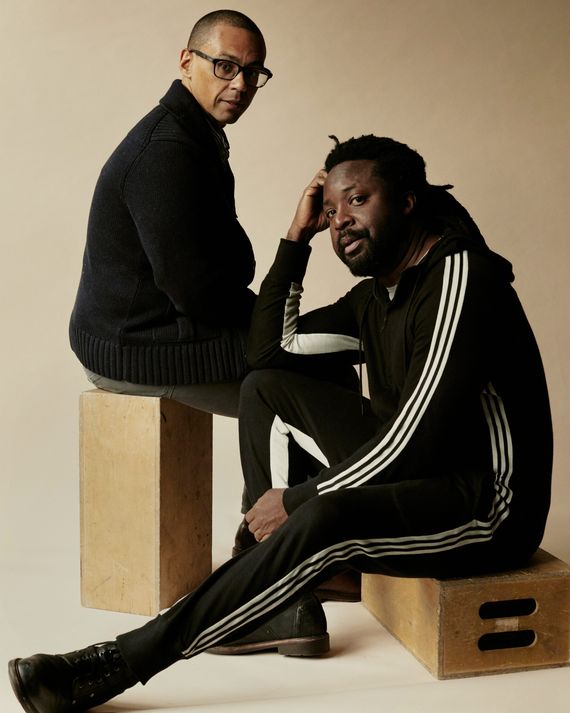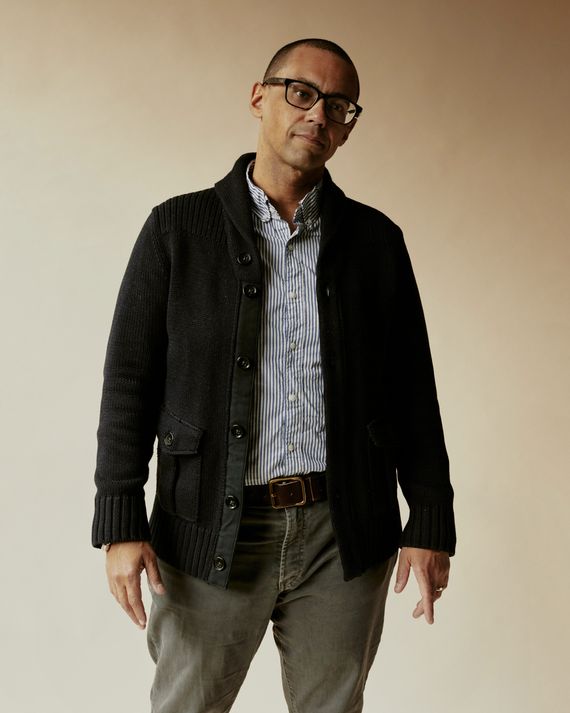The versatile authors talk race, fantasy, and JamessBlack Leopard, Red Wolfover dumplings.
Save this article to read it later.
Find this story in your accountsSaved for Latersection.

That was a great night, LaValle said.
James nodded and added darkly, Mismanagement killed that store.
They were coming together again just after LaValle had written aBookforumcover reviewofBlack Leopard.

This book might do his finest job yet of blending the horrific and the exquisite, he wrote.
You guys wanna get a drink?VL: Ill always say yes to a drink.
MJ: You know, theres the British colonial in me thats going,Alcohol?

VL: Ill get the Fallen Angels.
MJ: So I read your review.
VL: Whatd you think?
I actually kinda screamed.
VL: Did you feel all right with me talking about that aspect of it?
I dont mind people writing about the violence, but it tends to be all they write about.
VL: For a black writer writing about gangsters, violence is almost the go-to.
So as I was reading this one, I was like,Its here, too.
I just need to say, people should talk about sex.
MJ: Literary realism has this sort of indie-film attitude toward sex.
Violence is violent, but sex isnt sexy.
Its compulsive; nobodys happy; they enjoy the cigarette way more than the sex.
MJ: Right, theyre scared of love, too.
I know, because I was.
And anything that demands an extreme intimacy.
VL: Except violence.
Thats an intimacy that is tolerable.
MJ: I always give this out-there comparison toLed Zeppelin IV.
Yet almost every Led Zeppelin record is 50 to 60 percent acoustic.
Anybody else, thats like a really folky Jeff Buckley record with some loud noise.
Its because the loud tracks resonated.
I think people dont know the difference between resonance and preponderance.
Violence is supposed to resonate.
When violence happens in your family, that lives for generations.
Youre supposed to still be reeling from it ten pages later.
Violence should resonate and sex should resonate and romance should resonate.
Lets talk about whats going on in speculative fiction today.
It used to be people thought you were slumming if you wrote genre.
VL: Genre work can still face that problem of people saying, But whats itreallyabout?
That can still be the sticking point for this stuff being taken seriously or not.
I love reading the fantasy of middle-class life in Connecticut, because Ive never lived that before.
Do you all really cheat this much?
That to me is like,Wow!
MJ: I grew up in an independent Jamaica, but my classes were still very British colonial.
From a very early age, I thought,Thats bullshit.
Maybe its history; maybe its not.
Certainly men running around in green tights makes no fucking sense.
But to me, fantasy has to include comics, so Id also have to sayJustice League,Superman.
They used to have these things calledSuperman Family,Batman Family.
So theyd haveBatman,Batgirl,Batdog.
The little elf creature who also came from another dimension.
One of the great parts of growing up with comics is that things arent precious.
A new writer throws something against the wall and some things just last.
MJ: Its because that superdog was cooler.
VL: He was amazing!
The first book I loved mightve beenJourney to the Center of the Earth.
MJ: I forgot Jules Verne!Twenty Thousand Leagues Under the Sea.
VL: Theres this great adventure, and its always treated like its almost plausible.
This could happen, you could go to the center of the earth and find a prehistoric world.
In theory that was speculative realism up until you proved it wasnt.
AndTwenty Thousand Leagues Under the Seais still realism.
Each of you started out writing more realistic work, and each has now fully transitioned into genre.
I was mining personal details to the end of what that was worth.
The switch was to say,Let me at least return to joy.
It seems cheesy, but I really do feel like that sense of joy became imbued in the text.
People were touched by those first two books, but nobody ever said they enjoyed them.
I think its because I was enjoying myself.
Like I was trying to assume the form of a writer.Thisis what a writer should be.
It was in reading Salman RushdiesShamethat I had my breakthrough.
I didnt know you could just throw phantasmagorical stuff into a book like that.
I didnt know you could write a book as if there were no rules.
Then I wasnt afraid to put the story in my head down on paper.
MJ:You know what I envy about you, Vic?
You always get there first.
Your last book,The Changeling, plays on so many fantastical things.
Ill often think of something, and then Ill go, Oh shit Vic got there already.
I love how he kills off characters.
I love that there are adult consequences.
Theres certainly a very adult attitude toward sex and sexuality, which is very unlike most other genre books.
Thats one of the thrills of it.
But what was the question again?
Just the genre expectation it sets up, to call this the AfricanGame of Thrones.MJ:Oh god.
Because I said that as a joke.
VL:But it was too good.
It was a great line.
And it doesnt do that.
It doesnt do any special pleading.
These empires were powerful, great, interesting, small, petty, all that.
As a reader, it was such a relief.
So yeah, theres fairies, theres witches, theres immense evil, theres heroes, theres shape-shifters.
But a lot of the African mythologies deliberately upend those tropes, because theyre not European stories.
Theyre not secretly Christian allegories.
Take this one central African myth about a cannibal witch it follows none of the conventional narratives.
The witch doesnt get her comeuppance.
The only person who outsmarts her is her own daughter and her daughters best friend.
When she realizes shes outsmarted, she goes, Alright, Ill go die now.
And thats whats so great about it.
But my novel is teeming with betrayal.
In African storytelling the trickster tells the story, so youre already dealing with an unreliable narrator.
Martins books are missing that too.
I just raised my hand and was like, at least one person here, probably not.
MJ:Thats like me the last time I crashed aMad Menparty.
[VL laughs.]
But genre can also be something that helps readers engage with a work.
I actually had some trouble trying to find a British publisher for this book.
And neither audience will read it.
I wonder sometimes if the problem is that publishers and critics end up limiting the audience.
Theres no reason why a Toni Morrison reader shouldnt read Octavia Butler.
Theyre just like: I want to be wowed.
Its so huge, that tiny difference.
That was my big dream, to take over fromChris Claremont.
VL:Thats a pretty great dream!
Because almost everyone I knew who was in the creative field was something else.
They did it on their spare time, like the lawyer who sings.
I didnt know any writers.
I couldnt answer the question.
I think this is it!
I dont have anything else.
VL:For me, I think it was reading Stephen KingsNight Shift.
I wasnt thinking about it as a career, like Im going to make a living blah blah blah.
But it was like, what hes doing here with these stories, thats what I want to do.
I started writing essentially pastiches, or rip-offs, of a couple of those stories in particular.
The genres maybe havent caught up to the writers or the readers even quite yet.
It feels good imagining them having to wake up.
MJ:I didnt feel subversive.
I knew I would eventually.
I just knew I would end up here.